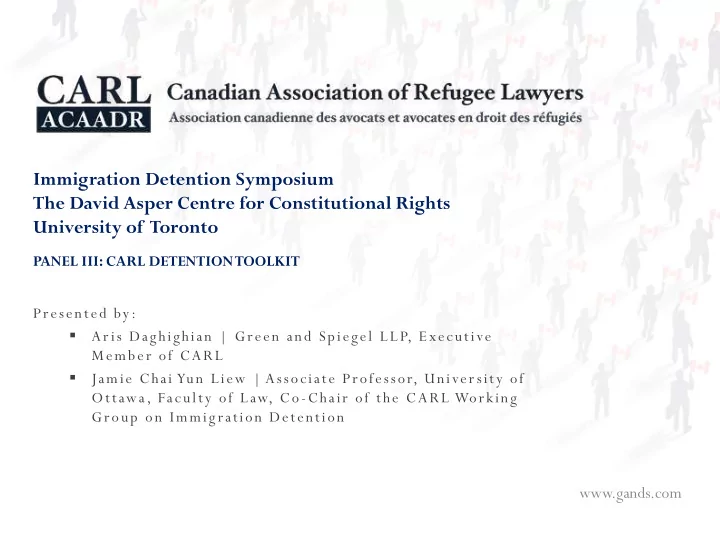

Immigration Detention Symposium The David Asper Centre for Constitutional Rights University of Toronto PANEL III: CARL DETENTION TOOLKIT Presented by: Ar is Daghighian | Green and Spiegel LLP, Executive Member of CARL Jamie Chai Yun Liew | Associate Professor, Univer sity of Ottawa, Faculty of Law, Co-Chair of the CARL Working Group on Immigration Detention www.gands.com
• Overview • Practical Tips • Disclosure and Transcripts • Grounds of Detention • Alternatives to Detention • Leading Oral Evidence • Cross examining/testing CBSA’s evidence • Working with detainees with mental health issues, addictions and other vulnerabilities • Past Decisions • Post-Hearing Follow-up • Questions? www.gands.com
Practical Tips: • Insist upon disclosure of ALL evidence. At issue recently before the FCA in Brown v. MCI, A- 274-17. The Trial Division in Brown held: “The Minister of PSEP must provide reasonable notice of the evidence or information that will be relied upon at the detention review. Detainees or their representatives may request further disclosure, and ask that the enforcement officer be summoned to appear at the hearing.” The Court further found: "If insufficient disclosure is provided, the detainee or representative may ask the ID to briefly adjourn the hearing, or to bring forward the date of the www.gands.com next review ."
Practical Tips: • Provide submissions on why community ties do not make your client a flight risk • Emphasize record of compliance • Lead evidence and make submissions on grounds for detention before presenting alternatives • Provide evidence demonstrating lack of capacity or will to evade authorities • Fear of returning does not make your client a flight risk • Ask for a contextual and balanced approach (see Scotland ) • Evaluate whether length of time in detention is proportional • If possible argue no grounds for detention. If unable to argue this, then lead evidence to contextualize the grounds • Ask CBSA to provide details of “proactive investigation” www.gands.com
Practical Tips: • Ask for alternatives to detention as often as possible • Emphasize release should be granted as soon as possible and with the least onerous conditions available ( R. v. Antic ) • Argue for alternative that does not rely on bond • Ensure that release plans include counselling, support or treatment • Propose again and again at each hearing. www.gands.com
Practical Tips: • Provide affidavits from bondspersons and the detainee • If the ID refuses to hear from the detainee or a witness, object and argue that it is a breach of natural justice. • Insist on the right of the detainee to present viva voce evidence to the ID directly • All objections should be made on record • Follow the rules of disclosure and provide advance information about the identity of the witness www.gands.com
Practical Tips: • CBSA must provide disclosure. • Ask the ID to adjourn the hearing or to bring forward the date of the next review. • If the sources of CBSA’s evidence are not clear, request that the sources be disclosed • If source of the evidence is a CBSA Officer, request that they attend the hearing to be cross-examined. • Argue CBSA’s evidence should not be admitted when they have not adhered to disclosure rules or are not willing to account for the sources of their evidence. • Ask probing questions regarding delays on CBSA’s part to any witnesses • Ensure that the Hearings Officer back their statements with evidence. www.gands.com
Practical Tips : Designated Representative (DR) • Notify ID for a need for a DR • DRs should take an active role in communicating with all involved • DRs can raise arguments on: • Impact of place of detention • Detainee’s mental health • Detainee’s capacity • Whether detainee is a flight risk and/or danger www.gands.com
Practical Tips : Medical Reports • Obtain a medical report from a psychiatrist, psychologist or other medical professional • If no medical professional in detention facility, request the detainee be transported to medical appointments • Make requests for transfer to: • CBSA • by making application to ID • Directly to the jail www.gands.com
Practical Tips : Flight Risk & Danger • Mental health is a substantive and not just procedural consideration • Include evidence on: • Medical reports • Medical conditions • cycles of addiction • Challenge CBSA/ID position that detainee’s mental health makes him/her a flight risk or danger to the public. • Refer to fact that detainee cannot access counselling/treatment programs in detention and that access to these would reduce any www.gands.com danger to the public.
Practical Tips : Capacity • Be aware of challenges that vulnerable detainees may have in adhering to release conditions • Refer to evidence of mental illness to argue non-cooperation is not voluntary • Provide evidence that persons struggling with addictions may find it challenging to stop using • Argue for conditions of release that are tailored for your client www.gands.com
Practical Tips : • Examine the record • Determine if facts presented are valid • Consider if facts need to be re-assessed • Challenge formulaic decisions that: • Rely on rigid statutory interpretation • Fail to decide afresh • Over rely on past decision • Fail to fully and independently consider alternatives • Push back on restrictive reading of Thanabalasingham • Insist on the final word and/or opportunity to respond www.gands.com
Practical Tips : • Request member to be seized of the matter, if appropriate, to assess changes to release plan • Request clarification from ID re shortfalls of release plan • Follow-up to ensure transcripts from last hearing provided in timely manner • Confirm progress with ongoing investigation or timelines for removal • If request early subsequent detention review, order submissions usually reversed www.gands.com
Questions? Jamie Liew |jamie.liew@uottawa.ca Aris Daghighian|arisd@gands.com www.gands.com
Recommend
More recommend